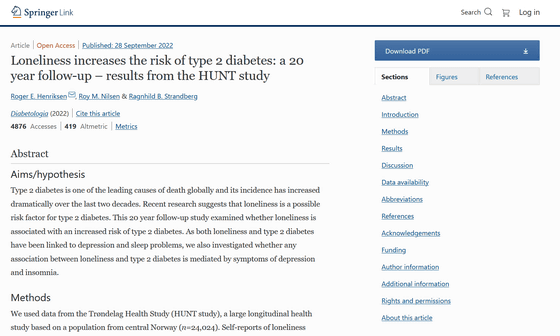Clearly that 'loneliness' doubles the risk of developing diabetes

Type 2 diabetes is a disease in which the blood sugar level rises due to insufficient secretion or inaction of the hormone / insulin that lowers the blood sugar level, causing complications such as terminal neuropathy and decreased vision. It is known that the risk of developing type 2 diabetes increases due to usual lifestyle and genetic factors, but research has shown that new `` loneliness '' also increases the risk.
Loneliness increases the risk of type 2 diabetes: a 20 year follow-up – results from the HUNT study | SpringerLink
https://doi.org/10.1007/s00125-022-05791-6

Loneliness is associated with double the risk of developing diabetes
https://medicalxpress.com/news/2022-09-loneliness-diabetes.html
The study was published by a research team led by Associate Professor Roger Henriksen of the Western Norwegian University of Applied Chemistry. The research team analyzed data used in collaborative research by the Norwegian University of Science and Technology, the Trondelag Provincial Council in Norway, and the Central Norwegian Regional Health Authority. The data consists of health information for over 230,000 people from four census runs from 1984 to 2019.
Of the 24,024 people selected from the second survey data, HbA1c , which indicates the ratio of hemoglobin bound to sugar in red blood cells, exceeded 48mmol/mol and was judged to have type 2 diabetes. was 1179 people. According to the research team, 59% of those diagnosed with type 2 diabetes were men, the average age was 48, and 73% were married. And from the survey at the time of the census, it was found that 13% of all participants complained of loneliness.
And the research team reports that high levels of loneliness were strongly associated with an increased risk of developing type 2 diabetes 20 years later. Participants who answered ``I feel very strongly'' when asked if they felt lonely in the questionnaire were twice as likely to develop type 2 diabetes as those who did not feel lonely.
Although the causal relationship between feeling lonely and developing type 2 diabetes is not clear, the research team suggests that social engagement and influence may have positive effects on health. For example, getting advice and support from friends can have a positive impact on diet, physical activity, and stress reduction. However, the research team speculates that these positive effects may be absent when social ties are low, resulting in lonely people at an increased risk of developing type 2 diabetes.

The research team said, ``It is important for healthcare professionals to have an open dialogue about patient concerns, including about loneliness and social interaction, during clinical consultations,'' and added clinical guidelines for type 2 diabetes to deal with loneliness. I argue that it should include
Related Posts:
in Science, Posted by log1i_yk







